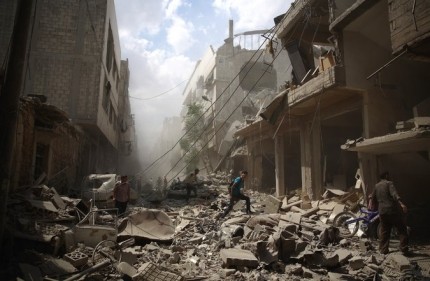
BEIRUT, Lebanon — Every morning, at the dawn call to prayer, women and children move silently from the Damascus suburb of Douma to the surrounding farm fields, seeking safety from the day’s bombardments by the Syrian government.
The walk is part of a surreal routine described by the fraction of Douma’s residents who remain: shopping on half-demolished streets, scavenging wild greens, carrying out mass burials. But not even the fields are safe; recently, medics said, bombs killed two families there — 10 people, including seven children.
As crowds of Syrians transfix the world with their flight to Europe, this kind of life is one of the many nightmares they are fleeing. They leave behind increasingly empty neighborhoods — from the Damascus suburbs to the northern city of Aleppo — that testify to the scale of their exodus.
Such bombardments have been going on for years in insurgent-held areas like Douma, one of the first areas to revolt against the government in 2011. And yet, the situation can still get worse. The past month in Douma made that clear.
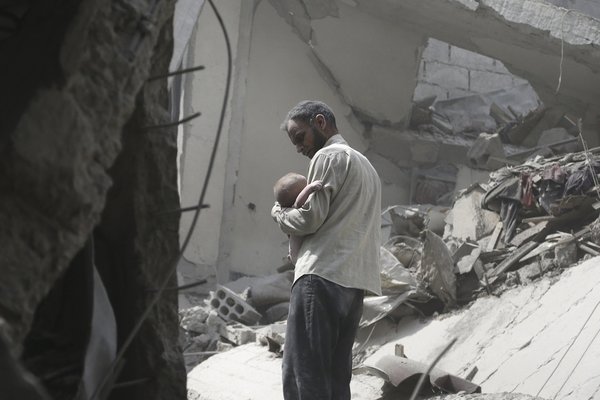
Government forces began a barrage even more intense than usual, using not only the artillery shells that Douma has come to expect, but also airstrikes. Perhaps four out of five residents had already fled what was once a bustling community of around half a million, and emergency workers say the new bombings drove out thousands more.
More than 550 people, mostly civilians, have died in the past month in Douma and nearby suburbs, 123 of them children, Red Crescent medics say. August was one of the bloodiest months in the district, with at least 150 trauma injuries being treated each day from Aug. 12 to 31 — a number that includes only patients from 13 makeshift clinics that work with Doctors Without Borders.
Such concentrated violence has shaken even the most steadfast holdouts, said Ahmed, a Douma resident and a paramedic in his 20s who asked to be identified only by his first name for his safety. Of those who remained in early August, half have fled, he said, while the rest trek daily to hide in the fields or stay “trapped at home, praying they won’t get killed.”
As international focus has shifted to the Islamic State’s highly publicized violence and the threat it poses beyond Syria, less attention has been paid to the original struggle between President Bashar al-Assad and the insurgent groups that rose up after the crushing of a protest movement in 2011.
But that earlier conflict was driving people from their homes long before the Islamic State existed in its current form.
Advocacy groups for the Syrian opposition, as well as international watchdogs like Human Rights Watch, have long contended that the security forces’ bombardment of insurgent-held areas like Douma takes the largest toll on civilians, killing far more people than the Islamic State. Although no definitive numbers exist, a tally by a Syrian civilian opposition group, the Violations Documentation Center, said that 18,000 had been killed by airstrikes, which only the government has the ability to carry out, and that more than 27,000 had died in shelling and rocket attacks by all sides.
The Syrian government says it is bombing terrorists.
Douma, like other poorly served cities around Damascus, rose up early, and many there took up arms. It is now a stronghold for the Army of Islam, an insurgent group. The Nusra Front, Al Qaeda’s arm in Syria, is also active there, while the Islamic State is not known to play a role.
Insurgents also use indiscriminate tactics. After the new wave of attacks in Douma, they shelled Damascus, killing at least 20 people, according to death notices on pro-government websites. No one claimed responsibility.
But in terms of scale, the government’s bombing of rebellious areas is on another level. It has laid waste to large sections of central Homs in western Syria, Aleppo and the Damascus suburbs. In Aleppo, the weapons of choice are shrapnel-packed barrel bombs, unguided and dropped from helicopters.
In the past month, more than 450 civilians died from government bombings in East Ghouta, a semicircle of opposition-held working-class towns around Damascus, according to lists kept by the local branch of the Syrian Arab Red Crescent. Many of the victims were in Douma, the group said, including elderly people, women and children.
But it is not just bombings that deform life in Douma. Years of government blockades have forced residents to depend on tunnels and smugglers for daily goods. Humanitarian aid is largely blocked, and few people can get in or out.
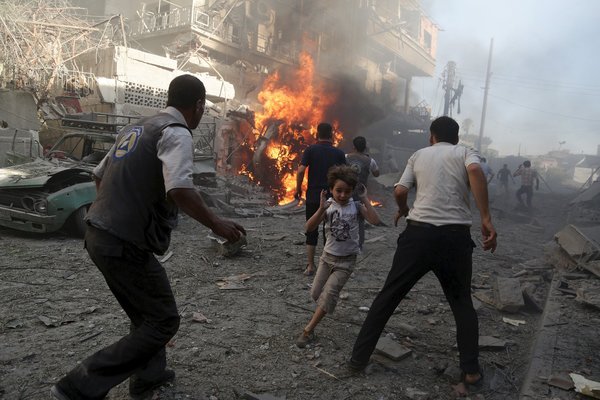
Government and opposition fighters alike take their cuts of bribes and smuggling revenues. Some insurgents act as warlords, enriching themselves and cracking down on dissent. The human rights lawyer Razan Zeitouneh and other secular opposition activists disappeared from Douma in 2013, believed to have been kidnapped after criticizing the Army of Islam.
So escape means dealing with smugglers and new risks, even for those who have no plans to take a boat on the Mediterranean. It begins from the moment of leaving one’s own block, on the way to Damascus.
“It’s completely normal for people to wish they can go overseas,” Ahmed, the paramedic, said. But, he added, “Can they?”
Those who do reach Damascus — joining seven million Syrians displaced within the country — can be harassed or even arrested by security forces suspicious of people from opposition areas.
That drives many to Lebanon, Jordan or Turkey, which host most of the four million Syrians officially registered as refugees abroad. The Damascus suburbs have hemorrhaged 165,000 people to Lebanon alone. But those countries have become less hospitable, with residency crackdowns and shrinking benefits. So refugees can go further afield, including to Europe. Or they can go back to Douma, and to a war that has killed a quarter of a million Syrians. Because of the siege and restrictions on journalists by combatants, life there can only be glimpsed on videos posted by insurgents, anti-government activists and rescue workers. They show streets engulfed by uneven piles of brick, rooftops tilted askew and steel reinforcement bars pulled apart like spaghetti.
In one recent clip, a volunteer — perhaps a teenager — slung over his shoulder the limp body of a small boy. In another, a slight youth dug a ragged, bloody corpse from under rocks until a voice behind him says, “Don’t film the body. Enough.”
Often, amid the search for survivors, there is no sound but the crunch and clink of rubble, and residents manage to utter just one sentence, “God is greater.”
“Neighborhoods fell on the heads of the residents,” Imad al-Din, a Douma resident, said recently over Skype. “The screaming can still be heard.”
“Black Sunday” is what Douma residents call Aug. 16. At least 122 people died in one of the war’s deadliest air attacks, on a vegetable market, according to rescue officials, the Syrian Network for Human Rights and other monitoring groups.
Bilal Abu Salah, a resident who left the market just before the strike, is haunted by the faces of the pushcart vendors who sold him cucumbers, zucchini and eggplant. Minutes later he saw one covered with blood; one died, two were seriously injured.
Dr. Adnan Tobaji operated in a makeshift basement clinic, sometimes on the floor, without anesthetic or sterile supplies. Shortages could be deadly, he said. One woman died waiting for a blood bag to arrive.
The new attacks have gutted Douma’s meager remaining street life and local institutions. Nine civil defense workers were killed. The local authorities imposed a curfew and even canceled Friday Prayer.
Douma’s free fall has prompted Dr. Tobaji and several hundred colleagues and residents to sign a petition calling for a complete humanitarian truce, hoping it spurs talks and ends the war.
The call is striking coming from rebellious Douma. It sets no preconditions for the fate of Mr. Assad, long a sticking point.
“The fate of Assad for us is nothing compared to the fate of Syria the country, the people and the children,” Dr. Tobaji said. “At this moment while we are talking a Syrian is being killed. We need a solution by any means to stop the fighting.”
The solution, he added, “might not suit me or many other people but it’s not for me or for this or that person. It’s for Syria.”
GAIN IS PROVIDING AID TO SYRIANS WHO ARE DISPLACED WITHIN THEIR OWN COUNTRY. CLICK HERE IF YOU WOULD LIKE TO KNOW OUR RELIEF EFFORTS.
(Article Source)
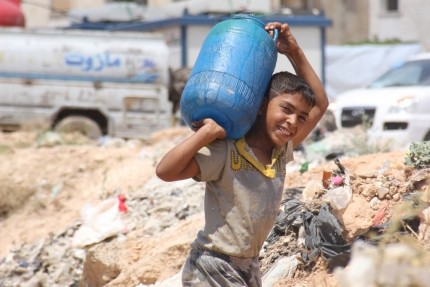
26 August 2015 – Amid the unremitting brutality of the war in Syria and a scorching summer heat wave, there is increasing evidence that parties to the conflict are using water to achieve military and political gains, warned the United Nations Children’s Fund (UNICEF).
“Clean water is both a basic need and a fundamental right, in Syria as it is anywhere else,” reminded Dr. Peter Salama, UNICEF Regional Director for the Middle East and North Africa in a press release. “Denying civilians access to water is a flagrant violation of the laws of war and must end.”
In recent months, up to five million people living in cities and communities across the country indeed have suffered the consequences of long and sometimes deliberate interruptions to their water supplies. That includes 2.3 million in Aleppo, 2.5 million in Damascus and 250,000 in Dera’a.
In the northern city of Aleppo, where fighting has crippled the main pumping station for months at a time, UNICEF has recorded 18 deliberate water cuts this year alone. Taps in some communities were left dry for up to 17 days in a row – and for over a month in some areas of the city.
With no water at home, children often take on the task of collecting water from street standpipes and collection points. One UNICEF engineer tells of a little girl he met who had stood in line for hours to fill two small water containers, only to realize that they were too heavy for her to carry. “She just burst into tears,” he recalled.
The unpredictability of warfare can make the process of fetching water dangerous, and even lethal, UNICEF underlined. In recent weeks, conflict cost the lives of at least three children while they were out collecting water in Aleppo.
Water shortages bring other consequences as well. Families in Damascus, Dera’a, Aleppo and other areas have to rely on dirty water from unregulated and unprotected groundwater sources, exposing children in particular to the risk of contracting diarrhoea, typhoid, hepatitis, and other diseases. In recent weeks, water prices have increased in Aleppo by up to 3,000 per cent, at a time when families are finding it harder than ever to make ends meet.
Syria’s water crisis has deepened along with the conflict; water availability is about half what it was before the crisis began in 2011. Ongoing violence and heavy clashes have caused severe damage to pipelines and other water infrastructure, and municipal workers are often unable to carry out the necessary repairs.
Frequent power cuts make it hard for technicians and engineers to pump water to civilians. Some areas receive only one hour of electricity a day and cuts lasting up to four days are reported. The misery is particularly acute for millions of displaced families who have to share limited water supplies in over-crowded shelters.
To add to the suffering, Syria – like much of the region – has been wilting under a heat wave said to be the harshest in decades. Temperatures in Aleppo have soared to above 40 degrees Celsius in recent weeks.
UNICEF called on parties to the conflict to take urgent steps to avert further suffering of civilians in Syria, by immediately halt water cuts and all actions that interrupt public water supplies, end all attacks on water facilities and infrastructure, and protect the safety of water engineers and other personnel who repair water supply installations.
IF YOU WOULD LIKE TO KNOW MORE ABOUT GAIN’S RELIEF EFFORTS, CLICK HERE.
(Article Source)
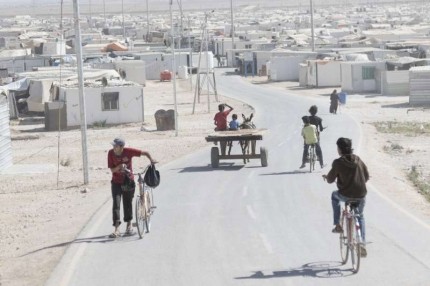
28 July 2015 – Living conditions for more than half a million refugees living in Jordan is becoming increasingly tough, the United Nations refugee agency warned today on the eve of the third anniversary of the establishment of Za’atari camp, which has grown into the largest refugee camp in the Middle East.
“Lines of tents that housed the first refugees to arrive in Za’atari have now been replaced by prefabricated shelters,” the Office of the UN High Commissioner for Refugees (UNHCR) said in a press release, but “more than half the population are children, presenting challenges not just on how to provide schooling and restore abruptly halted educations in Syria, but also in investing for the future.”
One in every three children is not attending school, and there are also some 9,500 young people in the camp between the ages of 19-24 who need skills training and, like their older counterparts, also need livelihood opportunities.
“More opportunities must be found for this generation, and the millions of other refugees around the region in similar predicaments,” said agency spokesperson Ariane Rummery. “They are the future of Syria.”
Za’atari camp is the largest refugee camp in the Middle East, with around 81,000 Syrian residents. The temporary settlement was established on 29 July 2012 amid huge inflows of refugees from Syria and the camp was set up in nine days.
As the camp marks its third anniversary tomorrow, UNHCR said that living conditions for more than 500,000 refugees living outside of camps in Jordan had become increasingly tough, with the latest survey showing 86 per cent of urban refugees live below the Jordanian poverty line of some $95 per capita per month.
According to UNHCR, those living in Amman, Jordan, in particular, are trying to survive in one of the most expensive cities in the Middle East.
The agency spokesperson also noted that “with Za’atari at capacity, the number of urban refugees seeking shelter in Jordan’s second camp, Azraq, increased fourfold in the first six months of this year.”
This trend is driven by increasing vulnerability of urban refugees in Jordan whose savings are depleted after years in exile, and who are unable to find secure legal livelihoods, UNHCR reported. Most have already seen the value of their monthly World Food Programme (WFP) food vouchers being cut in recent months and now face the prospect of losing them entirely from next month.
In all, more than 4,015,000 refugees are registered in the region neighbouring Syria, including some 629,000 in Jordan.
GAIN CONTINUES TO PROVIDE SUPPORT TO SYRIAN FAMILIES. IF YOU WOULD LIKE TO KNOW HOW, CLICK HERE.
(Article Source)
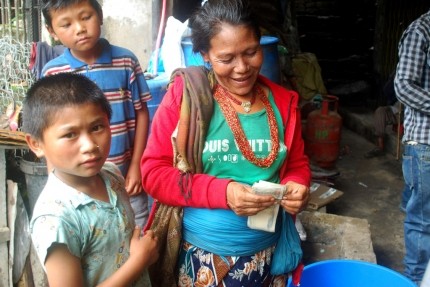
24 July 2015 – Three months after the first of the devastating earthquakes that hit Nepal, hundreds of thousands of survivors continue to require and rely on urgent humanitarian assistance, the top United Nations humanitarian official in the recovering country said today.
“The emergency is not over yet,” warned Jamie McGoldrick, the Humanitarian Coordinator in Nepal. “As long as humanitarian needs persist, relief agencies will continue to support the Government in addressing these vulnerabilities and ensuring the survival of communities affected.”
The cold and damp monsoon weather exposes those affected to further hazards and, together with customs delays, adds to the challenges aid agencies tackle daily. Shelter, food and livelihoods support, water and sanitation, medical and psychosocial care, and protection remain top priorities, he said.
In the last three months, the humanitarian community provided shelter assistance to 340,000 families, distributed food to over 2 million people and provided safe drinking water to some 2.5 million survivors in 14 most-affected districts, points out a press release issued by the UN Office for the Coordination of Humanitarian Affairs (OCHA).
Hundreds of thousands of children continue to benefit from education and psychosocial support. Almost all of health facilities also restored use of cash programming, which proved to be indispensable in achieving these goals and overcoming the topography challenge.
“I am heartened and encouraged by the dedication of the responders: the Government, the many volunteers, my colleagues. Together, we achieved a lot,” stated Mr. McGoldrick. “But we must continue.”
Basic shelter will continue to be provided to families who lost their homes, as more-durable shelter solutions are sought and implemented, underscore the press release. Aid agencies aim to assist more than 1.4 million people with food and another 1 million people with livelihoods support, and to provide safe drinking water and sanitation to 2.5 million people.
Medical camp kits will continue to replace damaged health infrastructure and temporary learning spaces are intended for additional 270,000 children. The humanitarian community is also planning ahead, to ensure the most vulnerable are assisted beyond the monsoon and prepared to survive through the harsh and cold wintery conditions.
“We cannot fail the most vulnerable communities, people who count on us more than ever with the monsoon season underway and the winter fast-approaching” stressed Mr. McGoldrick. “The humanitarian community can and will deliver on its commitments, provided that we receive the right support.”
To date, only $210 million, or 50 per cent, were received against the $422 million humanitarian appeal. An additional $222 million in support to post-earthquakes relief was provided directly to the Government of Nepal on a bilateral and in-kind basis.
GAIN IS STILL PROVIDING AID TO PEOPLE IN NEPAL. IF YOU WOULD LIKE TO LEARN MORE ABOUT OUR EFFORTS, CLICK HERE.
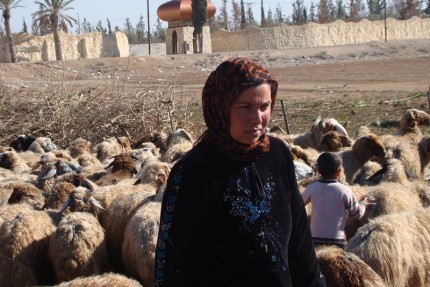
23 July 2015 – Syria’s food production in 2015 remains at 40 per cent below its pre-crisis levels, impacting the price of bread, which has spiralled by 87 per cent, and shrinking poultry production by half, according to a United Nations agency report released today that warns that “the risk of irreversible damage to the children is real, with tragic future consequences.”
“The evidence is clear: almost five years of conflict have destroyed the Syrian economy and the people’s ability to buy essentials like the food they need to survive,” said Arif Husain, chief economist of the UN World Food Programme (WFP).
The UN Food and Agriculture Organization (FAO) and the World Food Programme (WFP) said in their special joint report based on a crop and food security assessment mission to Syria that the 2015 wheat crop is expected to be better than the 2014 drought stricken harvest, but is still 40 per cent lower than pre-conflict production levels and “will not lead to significant improvements in the overall household food security situation.”
Some 9.8 million people in Syria are food insecure, with 6.8 million of these “severely” food insecure – a level of need that requires external food assistance, according to the report, which noted that since January this year alone, more than half a million people have been displaced.
“Although Syria’s current harvest is better than expected due to abundant rains, the country’s agriculture sector remains decimated by the conflict. Urgent donor support is needed to ensure farmers can meet the upcoming cereal planting season, beginning in October,” said Dominique Burgeon, Director of FAO’s Emergency and Rehabilitation Division.
The report said agricultural production continues to be impeded by shortages of fuel, farm labour and agricultural inputs, including seeds and fertilizers; high input costs and unreliable quality; as well as damages to irrigation systems and farming equipment.
Livestock production is also gravely affected by the conflict, the agencies said.
“The sector, once a major contributor to Syria’s domestic economy and to its external trade, has seen reductions of 30 per cent in cattle and 40 per cent in sheep and goats, while poultry, usually the most affordable source of protein in people’s diets has shrunk by 50 per cent,” according to the report. “The report also noted that the country’s veterinary service is rapidly running out of vaccines and routine drugs.”
And after being relatively stable in 2014, food prices began increasing sharply in early 2015 in the wake of lower government subsidies and exchange rate depreciation, the report noted.
“Critically, the price of bread has spiralled in the past year, increasing by up to 87 per cent in public bakeries,” it said.
The report said families were found to be spending more than half of their incomes on food and in some places such as Sweida, Aleppo and Hama this share is higher and has jumped to almost 80 per cent in Dara’a, one of the areas which have witnessed some of the most intensive fighting.
While an end to the conflict remains the main precondition for ensuring that people in Syria have adequate access to food, the FAO-WFP report recommends that in order to strengthen the resilience of affected communities, the establishment of village-based private seed production and distribution centres, promoting backyard vegetable and poultry production through distribution of improved seeds and chicks, as well as providing livestock vaccines and veterinary drugs.
“We worry about the continued displacement and its impact particularly on women and children,” said the WFP economist, Mr. Husain. “The risk of irreversible damage to the children is real, with tragic future consequences if this conflict lasts much longer.”
IF YOU WOULD LIKE TO KNOW MORE ABOUT GAIN’S RELIEF EFFORTS, CLICK HERE.
(Article Source)
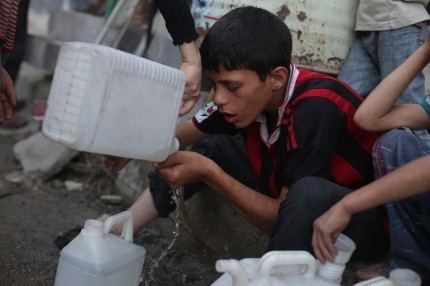
13 July 2015 – Syrian children are becoming increasingly vulnerable to water borne illnesses amid peaking summer temperatures and dwindling supplies of safe water, the United Nations Children’s Fund (UNICEF) warned today.
“The situation is alarming particularly for children who are susceptible to water borne diseases,” Hanaa Singer, UNICEF’s Representative in Syria reported in a press release. “With the crisis now in its fifth year, water has become even more scarce and unsafe, and poor hygiene conditions especially among the displaced communities are putting more children at severe risk.”
Since the beginning of 2015, said the UN agency, Syria has reported 105,886 cases of acute diarrhoea while also registering a sharp increase of Hepatitis A cases.
The situation is particularly dramatic in Deir-Ez-Zour, a city not far from Syria’s border with Iraq, where raw sewage has reportedly contaminated the Euphrates River from which the local population receives its water. As a result, UNICEF added, some 1,144 of typhoid cases have been reported.
“Since the beginning of the crisis, we’ve been working with a range of partners to support the vital water infrastructure on which some 15 million people in Syria depend,” Ms. Singer continued. “This includes drilling and equipping wells as alternative sources of water as well as supporting the local production and procurement of water treatment supplies.”
The conditions in Syria have steadily been deteriorating since the outbreak of the country’s conflict in March 2011.
The UN’s Office for the Coordination of Humanitarian Affairs (OCHA) has cautioned that some 12 million people in the Middle Eastern country today remain in need of humanitarian assistance – a twelve-fold increase since 2011. 7.6 million people have been displaced by the conflict and another 4.8 million people are in need of humanitarian assistance in hard to reach and besieged locations.
The humanitarian impact of the crisis is only further compounded by funding shortfalls which has seen wholesale cuts to the UN’s delivery of humanitarian aid – from food assistance to lifesaving health services.
IF YOU WOULD LIKE TO KNOW HOW WE ARE MEETING THE NEEDS OF SYRIANS, CLICK HERE.
(Source)
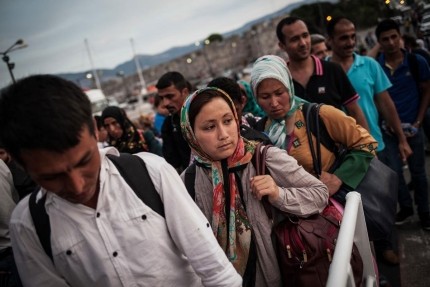
9 July 2015 – The exodus spawned by the four-year long Syrian conflict has now become the United Nations refugee agency’s largest crisis in almost a quarter of a century and risks deteriorating even further as fighting in the country shows no sign of abating.
In a news release issued earlier today, the Office of the UN High Commissioner for Refugees (UNHCR) confirmed the latest figures received from the field indicating that more than 4 million Syrian refugees have fled the Middle Eastern nation since hostilities began there in March 2011.
“This is the biggest refugee population from a single conflict in a generation,” lamented UN High Commissioner for Refugees António Guterres. “It is a population that deserves the support of the world but is instead living in dire conditions and sinking deeper into abject poverty.”
As it reaches the mid-point of its fifth year, the Syrian civil war has generated a steady outflow of refugees into neighbouring countries such as Lebanon, Turkey, Iraq and Jordan, burdening those countries’ infrastructures and leading to overcrowded settlements where many refugees struggle amid high unemployment and precarious services.
According to the latest data available, Turkey alone is host to over 1,800,000 registered Syrian refugees – more than any other in the world – with about 259,000 living in 23 camps set up and managed by the Government.
In addition, the numbers are only slated to increase amid intensified fighting across Syria, the UN refugee agency noted. Today’s 4 million milestone, in fact, comes barely 10 months since the total of three million was reached.
At the same time, however, life for Syrians in exile is becoming increasingly tough. The UN agency explained that some 86 per cent of refugees outside Jordanian resettlement camps live below the poverty line. In Lebanon, 55 per cent of refugees live in shelters considered to be “sub-standard.”
Meanwhile, in a recent report from the ground, the UN Children’s Fund (UNICEF) similarly warned that as the Syrian crisis has dramatically reduced family livelihood opportunities and impoverished millions of households in the region, children have been steadily pushed into the job market and are now being widely employed in harmful working conditions, risking serious damage to their health and wellbeing.
“Worsening conditions are driving growing numbers towards Europe and further afield, but the overwhelming majority remain in the region,” Mr. Guterres continued. “We cannot afford to let them and the communities hosting them slide further into desperation.”
While the conflict continues to push a steady outflow of Syrians across the region, the conditions of those trapped inside the country’s besieged cities remains equally dire.
The UN’s Office for the Coordination of Humanitarian Affairs (OCHA) has cautioned that some 12 million people in the Middle Eastern country today remain in need of humanitarian assistance – a twelve-fold increase since 2011. 7.6 million people have been displaced by the conflict and another 4.8 million people are in need of humanitarian assistance in hard to reach and besieged locations.
The humanitarian impact of the crisis is only further compounded by funding shortfalls which has seen wholesale cuts to the UN’s delivery of humanitarian aid – from food assistance to lifesaving health services.
IF YOU WOULD LIKE TO KNOW ABOUT GAIN’S WORK IN SYRIA, CLICK HERE.
(Source)
